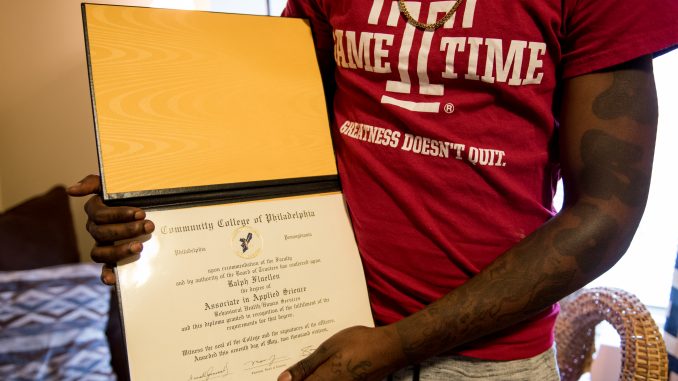
In an acting class at the Community College of Philadelphia, Ralph Fluellen performed a monologue about being judged for his appearance. The 27-year-old has about 100 tattoos and read about a phone call he had with a girlfriend when he was trying to convince her to let him meet her parents.
“If you love me as a person, they should be able to accept me, so basically looking behind my tattoos and looking at me as a person,” said Fluellen, a junior social work major. “It was good because I go through that with [job] interviews.”
Fluellen is the first graduate of the REACH College Program at CCP’s Reentry Support Project, that helps people with criminal records access higher education.
Tara Timberman, who founded the Reentry Support Project in 2010, became interested in the idea of reentry and education after teaching literature and public speaking classes at a South Jersey men’s prison.
“I saw the difference that accessing higher education made to folks who were there,” Timberman said. She added that many of the men were spending 20 years to life in prison. “It made them feel they were accomplishing goals that were normal that they had never pursued before.”
After she saw the impact the classes made on those individuals, Timberman realized a program like this could help people in Philadelphia who have criminal records or have faced jail time.
She joined the CCP staff as an English professor in 2009, and first started the project in the form of classes behind the walls of the Philadelphia Prison System.
In 2015, the Reentry Support Project received a grant and the REACH College Program, which helps people with criminal records to start working toward a college degree. It was modeled after her classes in the men’s prison in South Jersey and takes the approach of “treating the whole student,” Timberman said.

After one semester of courses at CCP in REACH, the students can move on to take regular courses and ultimately earn their associate’s degrees.
“You are recognizing that student success in college is not just about academic,” Timberman said. “Their success is their habits of mind, their soft skills, their ability to do things like time management. They all have different challenges they are going to face.”
For Fluellen, the road to education was not short or simple.
During his senior year at the now-defunct University City High School, Fluellen dislocated his rotator cuff while playing for his school’s football team. After the injury in 2006, everything started to go downhill for him, he said.
“I used sports to escape,” he said. “I enjoyed it. After that, I had the time to go outside and socialize with negative people, people that I thought were my friends.”
The summer before he was supposed to begin his freshman year at Indiana University of Pennsylvania, he was arrested for selling crack cocaine, which he said was supposed to get him through short-term financial struggles while trying to pay his tuition deposit. He was arrested a few more times over the next few years.
Fluellen said one night, in 2010, changed his life. He was out when he was stopped by a police officer and told to “look into the light” so his face could be seen. Over the radio, he heard the officer say, “First suspect I.D. confirmed.” The next day, he found out he was in jail for an armed robbery he didn’t commit.
After a year-long jail sentence, Fluellen was acquitted in early 2011.
“That woke me up, that there are really people in here that are really innocent and I was about to face a lot of time, so I was like, ‘I have to do something,’” he said.
After a drug-and-alcohol treatment program, Fluellen enrolled in CCP and became the first graduate of the REACH program in May 2016. He also had his record expunged in early 2016.
When Fluellen learned about Sigmund Freud and the science behind cognitive behaviors in a class at CCP, he said he understood why he committed past crimes.
“I was getting into my head…that’s why I did this,” Fluellen said. “I said ‘wow.’ That opened my mind.”
While he recovers from a car accident back in November, he’s taking online classes at Temple this semester and taking care of his mother who recently had surgery.
Fluellen said that enrolling at Temple has been a great experience, with 60 out of his 64 credits transferring from CCP — although it took some time for him to get used to large, lecture-hall courses with 200 people.
“I am a pea in a pot, you know,” he said. “I still kinda feel I have to build some self esteem and carry my head up more, I am new to them, they’re new to me.”
Emily Resnick, REACH’S academic support coach and social work supervisor, said it’s important to look at these students in the context of their environments.
“What is so necessary is to take each human being, find out their distinct challenges … and how their environment either helps or hinders their ability to address those needs,” said Resnick, a 2012 English alumna.
After finishing his bachelor’s degree, Fluellen said he wants to pursue his master’s of social work at Temple. He hopes to someday work with adults who have intellectual disabilities and open a group home.
Fluellen added that he credits the REACH program to helping him feel like he can fit in a college setting.
“I didn’t have convict written on my head,” he said. “With our program, even though we are together, we are still in the school, on campus, we can walk around. There is no stigma, we can blend right in.”
Emily Scott can be reached at emily.ivy.scott@temple.edu or on Twitter @emilyivyscott.


Be the first to comment